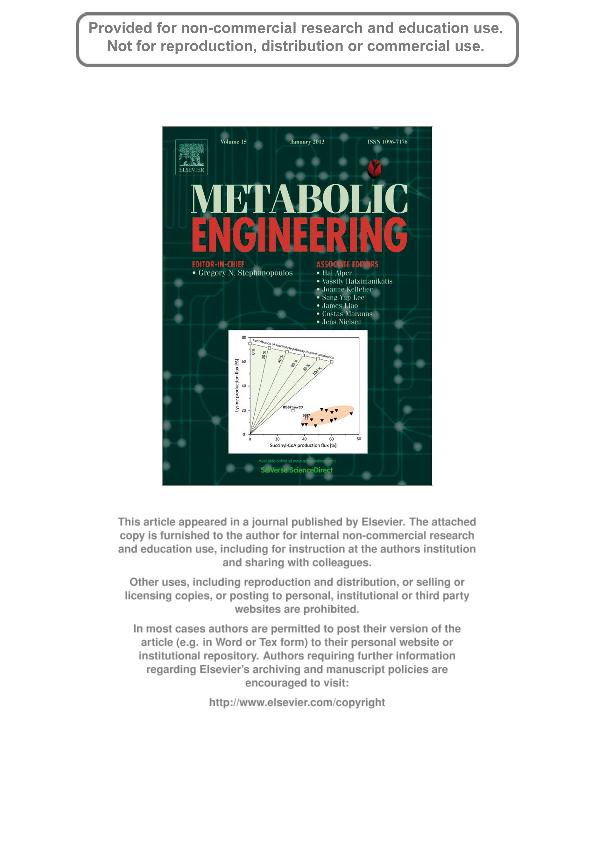Mostrar el registro sencillo del ítem
dc.contributor.author
Nikel, Pablo Ivan

dc.contributor.author
de Lorenzo, Víctor
dc.date.available
2017-09-11T17:55:22Z
dc.date.issued
2013-01
dc.identifier.citation
Nikel, Pablo Ivan; de Lorenzo, Víctor; Engineering an anaerobic metabolic regime in Pseudomonas putida KT2440 for the anoxic biodegradation of 1,3-dichloroprop-1-ene; Academic Press Inc Elsevier Science; Metabolic Engineering; 15; 1-2013; 98-112
dc.identifier.issn
1096-7176
dc.identifier.uri
http://hdl.handle.net/11336/23907
dc.description.abstract
Pseudomonas putida KT2440, a microbial cell factory of reference for industrial whole-cell biocatalysis, is unable to support biochemical reactions that occur under anoxic conditions, limiting its utility for a large number of relevant biotransformations. Unlike (facultative) anaerobes, P. putida resorts to NADH oxidation via an oxic respiratory chain and completely lacks a true fermentation metabolism. Therefore, it cannot achieve the correct balances of energy and redox couples (i.e., ATP/ADP and NADH/NAD+) that are required to sustain an O2-free lifestyle. To overcome this state of affairs, the acetate kinase (ackA) gene of the facultative anaerobe Escherichia coli and the pyruvate decarboxylase (pdc) and alcohol dehydrogenase II (adhB) genes of the aerotolerant Zymomonas mobilis were knocked-in to a wild-type P. putida strain. Biochemical and genetic assays showed that conditional expression of the entire enzyme set allowed the engineered bacteria to adopt an anoxic regime that maintained considerable metabolic activity. The resulting strain was exploited as a host for the heterologous expression of a 1,3-dichloroprop-1-ene degradation pathway recruited from Pseudomonas pavonaceae 170, enabling the recombinants to degrade this recalcitrant chlorinated compound anoxically. These results underscore the value of P. putida as a versatile agent for biotransformations able to function at progressively lower redox statuses.
dc.format
application/pdf
dc.language.iso
eng
dc.publisher
Academic Press Inc Elsevier Science

dc.rights
info:eu-repo/semantics/openAccess
dc.rights.uri
https://creativecommons.org/licenses/by-nc-sa/2.5/ar/
dc.subject
Pseudomonas Putida
dc.subject
Limited Oxygen Supply
dc.subject
Redox And Energy Balance
dc.subject
Biocatalysis
dc.subject
Organochloride
dc.subject
Biodegradation
dc.subject.classification
Bioprocesamiento Tecnológico, Biocatálisis, Fermentación

dc.subject.classification
Biotecnología Industrial

dc.subject.classification
INGENIERÍAS Y TECNOLOGÍAS

dc.title
Engineering an anaerobic metabolic regime in Pseudomonas putida KT2440 for the anoxic biodegradation of 1,3-dichloroprop-1-ene
dc.type
info:eu-repo/semantics/article
dc.type
info:ar-repo/semantics/artículo
dc.type
info:eu-repo/semantics/publishedVersion
dc.date.updated
2017-08-29T19:57:53Z
dc.identifier.eissn
1096-7184
dc.journal.volume
15
dc.journal.pagination
98-112
dc.journal.pais
Estados Unidos

dc.journal.ciudad
Orlando
dc.description.fil
Fil: Nikel, Pablo Ivan. Consejo Nacional de Investigaciones Científicas y Técnicas. Centro Científico Tecnológico Conicet - La Plata. Instituto de Investigaciones Biotecnológicas. Universidad Nacional de San Martín. Instituto de Investigaciones Biotecnológicas; Argentina
dc.description.fil
Fil: de Lorenzo, Víctor. Consejo Superior de Investigaciones Científicas. Centro Nacional de Biotecnología; España
dc.journal.title
Metabolic Engineering

dc.relation.alternativeid
info:eu-repo/semantics/altIdentifier/url/http://linkinghub.elsevier.com/retrieve/pii/S1096717612001127
dc.relation.alternativeid
info:eu-repo/semantics/altIdentifier/doi/http://dx.doi.org/10.1016/j.ymben.2012.09.006
Archivos asociados
